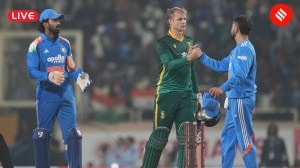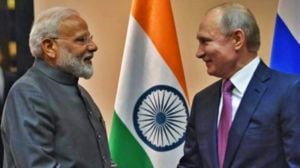Hurriyat tells Govt: Next talk stop has to be Pak militants
Days before it arrives in New Delhi for talks, the Hurriyat Conference today expressed its desire to cross the border to hold a dialogue wit...

Days before it arrives in New Delhi for talks, the Hurriyat Conference today expressed its desire to cross the border to hold a dialogue with the Pakistan-based militant leadership.
Confident that the Indian Government wouldn’t object, Hurriyat Chairman Abbas Ali Ansari added that if it did, ‘‘we would have to look at other options’’. However, he asserted, this did not mean withdrawal from talks with New Delhi.
Ansari said that the Indian gesture could help the Hurriyat leadership persuade the Pakistan-based separatists to end hostilities and join the peace process. ‘‘After our talks in Delhi we want to talk to the militant leadership in Pakistan and tell them that by giving us the go-ahead to come to Pakistan, Delhi has shown its sincerity of purpose. And now you can reciprocate by calling a ceasefire.’’
However, the Hurriyat’s efforts to enlist the backing of ‘‘all sections’’ for the historic talks with Deputy Prime Minister L.K. Advani, scheduled for January 22, have suffered a jolt with the moderate elements outside the conglomerate turning down its invitation to join the dialogue process.
Hurriyat leader Mirwaiz Umar Farooq, who is flying to New Delhi tomorrow, is spearheading the efforts to rope in other separatist leaders, and concedes he hasn’t made much headway.
Yesterday, moderate leader Shabir Shah came to the Hurriyat headquarters at Raj Bagh but rattled off a list of demands before he could lend his backing.
‘‘I made my views clear to all leaders—that unless all the key constituents of the Hurriyat Conference like the JKLF, Jamat-i-Islami and People’s League were taken into confidence, this dialogue would have no credibility with the people of the state,’’ Shah told The Indian Express.
He believes Hurriyat made a mistake by hurriedly agreeing to the talks even before evolving a consensus on them. ‘‘It took New Delhi three months to send the invitation after they decided to hold talks at the highest level, headed by Advani. Abbas Sahib should have delayed the meeting with Advani and tried to mobilise support from all sections for the dialogue. But they showed undue haste. We believe in talks but we don’t want to be part of this dialogue.’’ In another setback to the Hurriyat, the editors of English and vernacular dailies it had invited for ‘‘exchange of views’’ today morning also stayed away, calling the invitation a joke.
The editor of the widely circulated Urdu weekly Chattan, Tahir Mohiudin, said the invitation was just a formality to make the government feel that all sections are with the talks. Mohiudin is believed to have close ties with Sajjad Lone’s Peoples’ Conference.


- 01
- 02
- 03
- 04
- 05





























